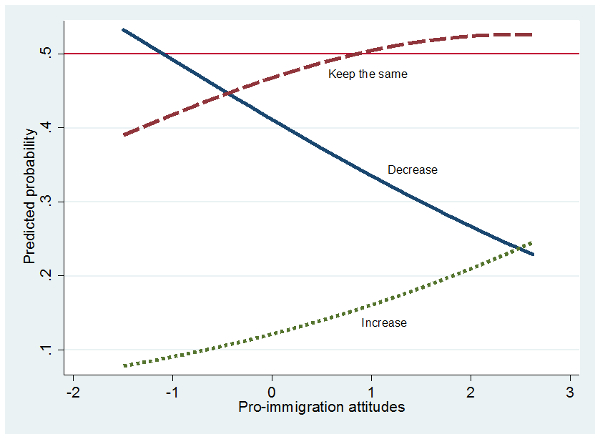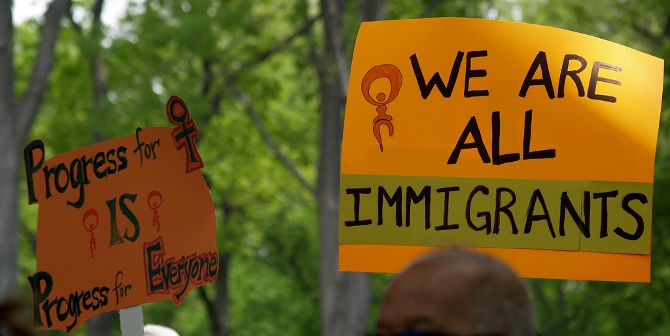

 Whether immigrants to the US are a negative or positive influence on US society has been the source of much debate in recent years. In new research, James Garand, Ping Xu, and Belinda C. Davis examine the relationship between people’s attitudes towards immigration and welfare. Using election data, they find that those who are in favor of immigration are also more likely to support welfare and greater welfare spending. They write that much of this relationship can be explained by the growing “immigrationalization” of welfare attitudes in recent decades due to demographic change and the growing number of immigrants participating in welfare programs.
Whether immigrants to the US are a negative or positive influence on US society has been the source of much debate in recent years. In new research, James Garand, Ping Xu, and Belinda C. Davis examine the relationship between people’s attitudes towards immigration and welfare. Using election data, they find that those who are in favor of immigration are also more likely to support welfare and greater welfare spending. They write that much of this relationship can be explained by the growing “immigrationalization” of welfare attitudes in recent decades due to demographic change and the growing number of immigrants participating in welfare programs.
The increase in the immigrant population in the United States over the past four decades has drawn considerable attention from both scholars and political observers. Scholars have considered the economic, political, and social implications of the influx of immigrants, and politicians and the mass public are embroiled in debates about the degree to which expanded immigration has had a positive or negative effect on American society. In particular, there is disagreement about whether immigrants are a net negative by drawing a disproportionate level of resources from the American welfare state.
With this in mind, we consider in this paper the effects of Americans’ attitudes toward immigration on their support for the welfare state. In previous research scholars have explored the relationship between racial attitudes and welfare attitudes, and these studies have shown that how Americans think about race is related to how they think about welfare programs. Simply, Americans who have positive views toward black Americans and who see blacks as conscientious and hard-working are significantly more likely to support welfare programs than those who have more negative views toward black Americans.
In our research we use data from the Cumulative American National Election Study (CANES) from 1992 to 2012 to explore the linkage between individuals’ immigration attitudes and their attitudes toward welfare. We measure immigration attitudes in three ways: (1) affect toward illegal immigrants, based on a feeling thermometer ranging from 0 (negative) to 100 (positive); (2) support for immigration, measured as a three-point scale ranging from -1 (respondent supports decreased immigration) to +1 (respondent supports increased immigration); (3) a “pro-immigration” scale, based on a factor analysis of the first two items. We measure welfare attitudes using two survey items: (1) affect toward welfare recipients, ranging from 0 (negative) to 100 (positive); and (2) support for welfare spending, measured as a three-point scale ranging from -1 (respondent supports decreases in welfare spending) to +1 (respondent supports increases in welfare spending).
We find strong support for our hypothesis that immigration attitudes are positively related to welfare attitudes. Simply, in all of our models – which withstand robustness tests – individuals who think highly of illegal immigrants and/or who support increases in immigration are strongly and significantly more favorable in their assessments of welfare recipients and more supportive of increases in welfare spending. These results stand even in the face of statistical controls for other variables thought to have an effect on welfare attitudes. The magnitude of these effects is quite high. To illustrate, in Figure 1 we show the effects of the pro-immigration scale on the predicted probabilities that individuals support increased, decreased, or the same level of welfare spending. As one can see, increases in pro-immigration attitudes result in a substantial decrease in the probability that individuals support decreases in welfare spending, from p = 0.532 for the lowest value on the pro-immigration scale to p = 0.229 for the highest value. On the other hand, increases in pro-immigration attitudes result in discernible increases in both the probability that individuals support increases in welfare spending or keeping welfare spending the same. Clearly, how Americans think about immigration has a strong effect on attitudes toward welfare spending.
Figure 1 – Relationship between pro-immigration attitudes and support for greater welfare spending, selected years (1992-2012).

Source: Cumulative American National Election Study
What is particularly noteworthy about our findings is that the magnitude of immigration attitudes effect is the second largest in our model, only behind the magnitude of the effect of attitudes toward the poor. In other words, how Americans think about immigration is the second strongest predictor of welfare attitudes, even greater than the effects of attitudes toward blacks, partisan identification, liberal-conservative ideology, and family income, among others. This suggests the “immigrationalization” of welfare attitudes during a time period that has seen a substantial increase in both the number of immigrants and the share of immigrants participating in some welfare state programs.
The bottom line is that how Americans think about immigration is a powerful predictor of Americans’ welfare attitudes. Based on our findings, we contend that the immigration wave and resulting demographic change that has occurred in the past four decades has shifted America’s welfare state from being “racialized” to being more “immigrationalized”.
A version of this article first appeared at the AJPS blog and is based on the paper “Immigration Attitudes and Support for the Welfare State in the American Mass Public” in the American Journal of Political Science.
Featured image credit: takomabibelot (Flickr, CC-BY-2.0)
Please read our comments policy before commenting.
Note: This article gives the views of the author, and not the position of USAPP – American Politics and Policy, nor the London School of Economics.
Shortened URL for this post: http://bit.ly/1Ol2nq5
_________________________________
 James C. Garand – Louisiana State University
James C. Garand – Louisiana State University
James C. Garand is the Emogene Pliner Distinguished Professor of Political Science at Louisiana State University. He is former editor of American Politics Quarterly, former President of the Southern Political Science Association, and a 2006 recipient of the LSU Distinguished Research Master Award. His research interests are widely dispersed throughout the field of American politics.
 Ping Xu – University of Rhode Island
Ping Xu – University of Rhode Island
Ping Xu is an Assistant Professor of Political Science at the University of Rhode Island. Her research interests include political economy, inequality, globalization, the welfare state, and Chinese politics.
 Belinda C. Davis – Louisiana State University
Belinda C. Davis – Louisiana State University
Dr. Belinda Creel Davis specializes in public policy. Much of her research uses welfare policy in the American states as a vehicle for examining theories of public policy. Current research projects include welfare migration, electoral competition, and Medicaid implementation.




